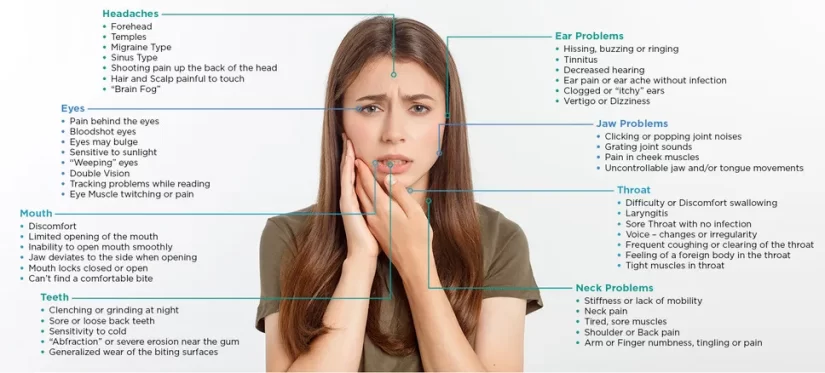TMD, or Temporomandibular Dysfunction is a condition involving strain or an imbalance in the TMJ (Jaw Joint) or associated structures. It can have wide reaching effects and symptoms throughout the body, all the way to the feet.
TMJ stands for Temporomandibular Joint (or Jaw Joint). So, the TMJ is the Joint itself, and TMD is probably why you are reading this…
The symptoms vary considerably from one person to another, and are very widespread, which makes TMD very complex to understand and properly diagnose. No two people are exactly the same in this, so careful and thorough diagnosis is required.
According to Bader et al –
“Temporomandibular pain has a musculoskeletal origin because it occurs as a consequence of masticatory muscle function disorder and temporomandibular joint disorder. Most common diagnoses of disorders are disc displacement and osteoarthritis, but their comorbidity can also occur.”
TMD has been called “The Great Imposter” because its symptoms often mimic other conditions. We have often seen situations where people have been treated for Migraine (for example) with no real success. Our examination finds that the headaches are actually TMD problems, requiring a very different treatment. Also, in some cases, those who suffer with True Migraines can gain significant relief with our treatments.
TMD can cause various problems, with or without pain, throughout the body, but most of the symptoms are usually experienced in the head and neck. If you have any of the following symptoms, you should seek advice from a Dentist experienced in the treatment of TMDs – like Dr Baret at Mountains TMJ & Dental Sleep Medicine.
Common Symptoms –
- Headaches – particularly in the temple area or behind the eyes
- Aching in and around the ears
- Aching in the jaw joints
- Clicking, popping, grating or crunching sounds in the jaw joints
- Locking of the jaw joints – limited mouth opening
- Pain or tenderness in the cheeks or jaw
- Clenching or grinding the teeth
- Pain or difficulty chewing
- Frequent neck or shoulder pain
Less frequent but potentially more concerning
- Dizziness
- Sharp Facial Pain
- Deep ear pain
- Facial Swelling
- Neck or upper back spasm
- Severe Headaches resembling Migraines
- True Migraines
- Severe or constant pain behind the eyes
- Severe neck or shoulder pain
Diagnosis will seek out the cause of your specific problem – which is most commonly a problem with joint function, or dysfunction – and seek to find a way to treat the cause as well as the symptoms.
If you wish to find out more, please contact us and arrange an appointment.
Reference – Badel T et al “Clinical view of The Temporomandibular Joint Disorder” – Acta Clin Croat 2014; 53:462-470
Copyright © 2023 Mountains TMJ & Dental Sleep Medicine

